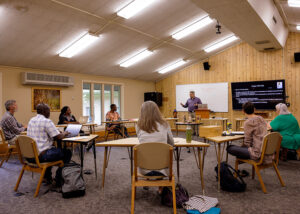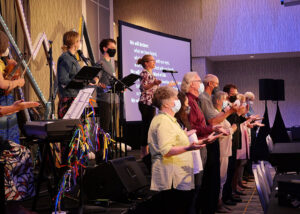When God’s story connects with our story, the Holy Spirit is at work, bringing life. As author Anne Lamott says, “I do not at all understand the mystery of grace—only that it meets us where we are but doesn’t leave us where it found us.”
In Jesus’ encounter with the Samaritan woman at the well (John 4), Jesus listened deeply to her story and respected her. She felt seen, heard, known. Because of that, she trusted him and was open to receiving the gift he offered, something better than the status quo. He revealed himself as the Messiah and offered her a life-giving word which brought her hope and joy. The encounter changed her whole life.
How does it change our lives when we are respected, deeply listened to, seen, heard and known? We experience dignity, value and hope. There were many reasons for a Jewish rabbi to reject the Samaritan woman, but Jesus did not let any of those reasons stand in the way of giving her dignity, value and hope.
At our congregation’s recent Pride and Diversity Sunday, I related the story of a life-changing conversation I had with a religious leader when I was in my twenties. At that time, I wasn’t so sure about how God felt about queer people. This was the mid-1980s, when people were dying from AIDS. Some of them were my friends and it was common to hear this epidemic blamed on the “sinful homosexual lifestyle.” Even though I had gay friends and did not have a problem with their being gay, I was wondering if that was a problem for the church, or for God, especially when I started having questions about my own sexual orientation.
At the time, I was attending a United Church in Toronto and had a private talk with my minister about these questions. If I’m not straight, is it a problem for God? Is it a sin I would have to conquer? Is it a problem for the church?
His immediate response was that there was nothing that would keep God from loving me and that I was welcome in the church too. I can’t tell you what a relief it was to hear that! From that time on, I have never again had to question whether God would love me because of it, or whether I belonged in the church because of it. Because I also knew some gay Christians I respected, it helped me to understand that these two things were not mutually exclusive.
I went into that conversation with trepidation, but I must have had some hope too, and openness to hearing what that minister would tell me God and the church had to say to me. Thank God—truly—the word he gave me was life-giving. For me, that was a life-changing conversation.
What does the life-giving word sound like? Maybe something like this: Whatever your questions are, whatever your life situation, whatever barriers you think might be between you and God, know that God created you with love. Jesus wants to be in relationship with you. And the Holy Spirit guides us to create life-giving relationships with one another.
Adapted from a sermon given on June 12 at Edmonton First Mennonite Church, where Elizabeth is a lay leader. She also serves as secretary of Mennonite Church Alberta.
Read more From Our Leaders columns:
At work with God on climate change
When the ‘grey’ is not holy
Reflection on Ukraine
Listen, debate, decide
‘It is hard to be afraid when you understand’









Leave a Reply
You must be logged in to post a comment.